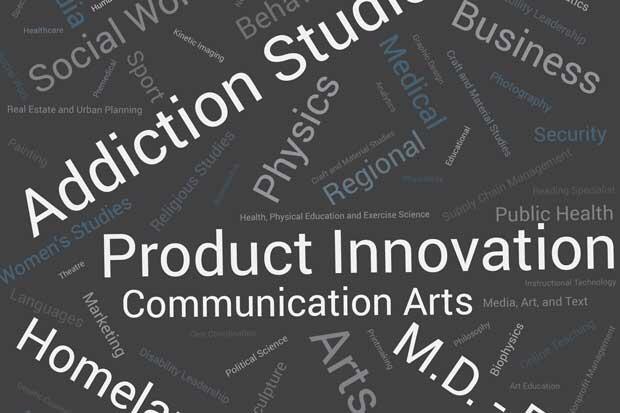
April 4, 2018
‘I can get a degree in that?’ A look at some of the unique programs you can study at VCU.
Share this story
Virginia Commonwealth University’s diverse, urban environment and focus on multiple disciplines — 217 degree and certificate programs in all — lead to a wide variety of career paths. Students can learn to do anything from delivering babies to designing imaginary robot armies for the latest Hollywood blockbuster.
Here’s a snapshot of just a few of the innovative and out-of-the-box academic programs that VCU offers:
Communication Arts
India Williams-Valle, a student in the Communication Arts bachelor’s program in the School of the Arts, loves the whimsy of children’s story illustration. It shows in her digital drawings of playful purple platypuses and robins red as rooibos.
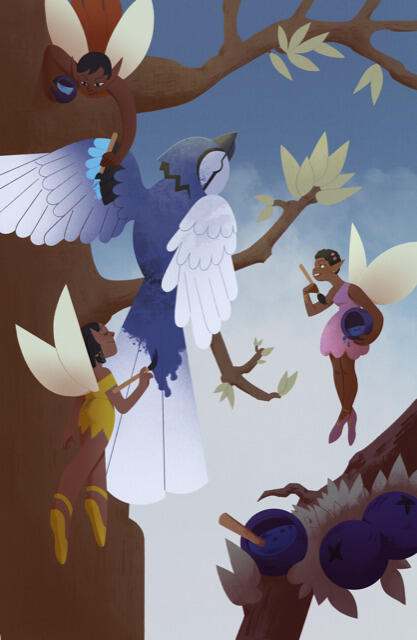
Williams-Valle created the drawings as part of the Communication Arts Honors Studio, for which students with exceptional portfolios are hand-picked by instructors. During the course, Williams-Valle honed her artistic and client service skills — two cornerstones of the Communication Arts program, which focuses on developing artistic talents to meet industry, client and media-based needs.
Last spring, honors students created promotional materials for early literacy initiatives of the Library of Virginia in the theme of biomes. Williams-Valle created illustrations based on deciduous forests. She said the project inspired her to focus on children’s media illustration though digital art.
“I’m drawn to illustration for children because it’s very impactful and I think frequently children’s media gets played down as not being as important or effective as adult media,” she said. “Illustration is the gateway by which so many children learn about art, appreciating art and about themselves, which has always spoken to me.”
After she graduates in May, Williams-Valle intends to freelance as a children’s media illustrator.

“Communication arts is focused not just on creating the work, but getting it out to the world,” she said. “They teach us about client relations and how to have a professional presence. We are taught a lot of business principles.”
Communication arts graduates are “illustrators, artists and designers that function a great deal like a service dedicated to adding value to the projects of others,” said TyRuben Ellingson, assistant professor and department chair.
Strong candidates for the program draw exceptionally well and can employ that skill to create lifelike observational drawings and creative, imaginative works. Computer illustration, 3-D modeling and digital animation skills are also paramount, depending on a student’s goals. Potential careers could include art direction; conceptual design for movies, books and video games; graphic design; or medical and scientific illustration.
Ellingson himself has created conceptual designs for film productions such as “Blade II,” “Hellboy,” “Hellboy II: The Golden Army,” “Pacific Rim” and “Avatar,” among others.
But before the careers of his students can take off, they learn the fundamentals of their craft in courses such as Creature Anatomy, which focuses on how animal biology can inform the creation of imagined life forms; Imagery for Children; Comics to Film, which explores the history of comics and how they transitioned to the big screen; Robot Design; and Figure Drawing.
If students can dream it, they can create it and make a living from their imaginings, Ellingson said.
“The department attracts students who want their art and creativity to be the central focus of their professional lives,” Ellingson said. “And, as there are always a great number of students who have this type of goal, the program is dedicated to assisting them.”
The work of Williams-Valle and other graduating students will be showcased at the Senior Communication Arts Expo on May 4 at The Depot from 4 to 9 p.m.
International Programme in Addiction Studies
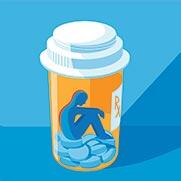
The post baccalaureate International Programme in Addiction Studies in the School of Medicine is a global collaboration among three leading universities in the field of addiction research – VCU, King’s College London, and the University of Adelaide in Australia. The online program allows students around the world to obtain a master’s degree in addiction studies, or one of two post baccalaureate certificates (advanced and intermediate).
Founded in 2008, the program exposes students to multicultural approaches to drug addiction prevention and treatment, and research and policy issues in the addictions field. The online curriculum keeps students abreast of international trends in addiction without the expense of travel. IPAS appeals to professionals working in addictions fields, including physicians, nurses, counselors and public safety officers, as well as those looking to enter it, said program director Mary Loos, Ph.D., associate professor of psychology in the College of Humanities and Sciences.
“The fully online nature of the program not only allows students in remote international locations to access the latest in addiction-related knowledge, it also gives U.S. students the benefit of exposure to the diverse perspectives of their international faculty and peers,” Loos said. “This is particularly useful in studying addiction, where cultural beliefs and biases often lead people to favor known approaches and to fear innovation.”
Western European and Australian approaches to addiction are frequently more forward-leaning than those in the U.S., Loos said.
Students in the master’s program train to fill leadership roles in addiction fields, and gain an advanced understanding of scientific methodology, the latest treatment recommendations and public health policies. The advanced certificate option provides an in-depth understanding of a broad range of addiction related topics without the need to produce original research. An intermediate certificate does not focus on research methodology but surveys how addiction affects specific populations. VCU is the only school in the state to offer these programs.
Amira Turner, who will graduate this year with a Master of Science in addiction studies and a Master of Social Work, said the knowledge she has gained from IPAS directly translates to her role as coordinator of the REVIVE! Opioid Overdose and Naloxone Training for Virginia.
“I can see the difference in walking in the doors two years ago compared to now,” Turner said. “It’s amazing to get feedback from three different universities across the world, with three different mindsets, to understand different components of addiction.”
Turner trains health and public safety workers, and the lay public, to administer, or train others to administer, naloxone — a life-saving drug that reverses the effects opioids have on the brain. Since November 2016, any Virginia resident is legally permitted to request naloxone from a pharmacy without having first visited a health care provider.
Turner envisions a career that leverages her passion for community education on addiction recovery and prevention, or focuses on addiction public health policies on the state and federal levels.
“I want to utilize my education and experience in state level efforts to further the understanding of addiction across professions,” Turner said. “The more knowledge and understanding we have, the better we are able to address underlying causes of addictive disorders and contribute to paving the road to recovery for those who are battling addiction.”
Homeland Security and Emergency Preparedness
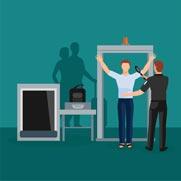
Kiana Miller has always envisioned her dream job as one that allows her to “kick down doors” in pursuit of criminals and “collect interesting information and intelligence about the country.”
Miller found her perfect match in the Bachelor of Arts Homeland Security and Emergency Preparedness program in VCU’s L. Douglas Wilder School of Government and Public Affairs.
The program is the first of its kind in the country and the only such program in Virginia. Launched in 2005, it is increasingly more important as threats such as the school shooting in Parkland, Florida; Hurricane Maria in Puerto Rico; and the package bombs in Austin, Texas, occur more frequently, said William Pelfrey Jr., Ph.D., associate professor and program chair.
“These are all recent tragedies that have emergency management and homeland security personnel at the front of the response,” he said. “This is a critical time to understand the field of Homeland Security and Emergency Preparedness. These professionals serve the public and private sector and help prevent or respond to crisis situations.”
Students learn how various groups, such as first responders, government agencies, charities and communicators, work together to coordinate a response that best serves victims of tragedies. They learn to anticipate and prepare for emergencies, and train to work in fields such as terrorism prevention, intelligence and law enforcement to apprehend perpetrators and prevent large-scale domestic attacks.
“No agency works in isolation; effective homeland security and emergency response is a symphony of players and roles,” Pelfrey said.
On a state and local level, graduates might work for city and county governments, hospitals and large businesses to facilitate continuity after major disasters.
Miller has been interested in homeland security and emergency preparedness since high school, when an internship with the U.S. consulate’s regional security office in Shanghai, China, piqued her interest. Miller observed approaches to counterintelligence and anti-terrorism. She is also president of the Wilder School’s chapter of Eta Lambda Sigma, a fraternity for aspiring homeland security and emergency management professionals. As a member of VCU’s Army ROTC program, Miller will be commissioned as a second lieutenant after she graduates in May. She hopes to gain experience working on intelligence that would transfer to homeland security work.
Miller said it was rewarding to have learned from the real-world knowledge of her professors.
“A really cool thing about our program is that since it is such a new major, your professors are not people who have just studied and written papers on the subject. They are people who actually work in the field,” she said. “You can actually talk to them about real-life experiences and what to expect.”
Product Innovation

A master’s degree in product innovation, offered by the VCU da Vinci Center, shapes students into entrepreneurs who can generate creative ideas and execute them with technical and marketing expertise.
Students from diverse academic and professional backgrounds come to the da Vinci Center to refine product and service development skills, said Garret Westlake, Ph.D., director of the da Vinci Center, a collaboration of VCU’s schools of the Arts, Business and Engineering and the College of Humanities and Sciences.
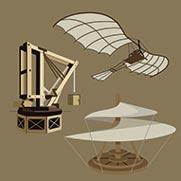
“The MPI program is designed to provide an applied educational experience in product innovation from multiple perspectives,” Westlake said. “The program is particularly valuable to entrepreneurs looking to validate their ideas and move them into the market. It is also designed for returning professionals to build on their corporate innovation experience to develop the next generation of product and project managers, and designers.”
At the start of the program, students receive a crash course in product development by participating in the European Innovation Academy in Turin, Italy. VCU participants collaborate with students from 70 different countries to develop startup concepts, supporting businesses and prototypes within a three-week span. Throughout their education, MPI students also learn product development regulatory requirements, and develop the skills to bring together varying expertise within an organization.
MPI student Hilton Bennett said the program allows him to use his training as an engineer. Bennett received a bachelor’s in mechanical engineering from the VCU School of Engineering and will graduate from the MPI program in December.
“My background in mechanical engineering helps me to more intuitively design prototypes, and understand how a product will function,” he said. “I can sketch the concept, give it form via computer-aided design platforms and generate material recommendations to build a functional prototype.”
Bennett loves to generate ideas and tinker. The avid rock climber is currently developing equipment that would allow recreational climbers to practice and perfect outdoor techniques on indoor climbing walls.
Bennett is also part of a three-student team exploring the commercial potential of an air pump that halves the time it takes to inflate items such as bounce houses and rafts by doubling the supplied air volume.
Bennett was recognized this year with the Black History in the Making award, given by the VCU Department of African American Studies.
The innovator said he aims to embody the spirit of the da Vinci Center’s namesake in all his endeavors.
“When you think about da Vinci, he was a Renaissance man with an insatiable curiosity who was practiced in everything from engineering to anatomy, the sciences and art,” Bennett said. “You aren’t focused in one discipline; you must approach your idea from a holistic point of view.”
Volunteer Doula (School of Nursing)
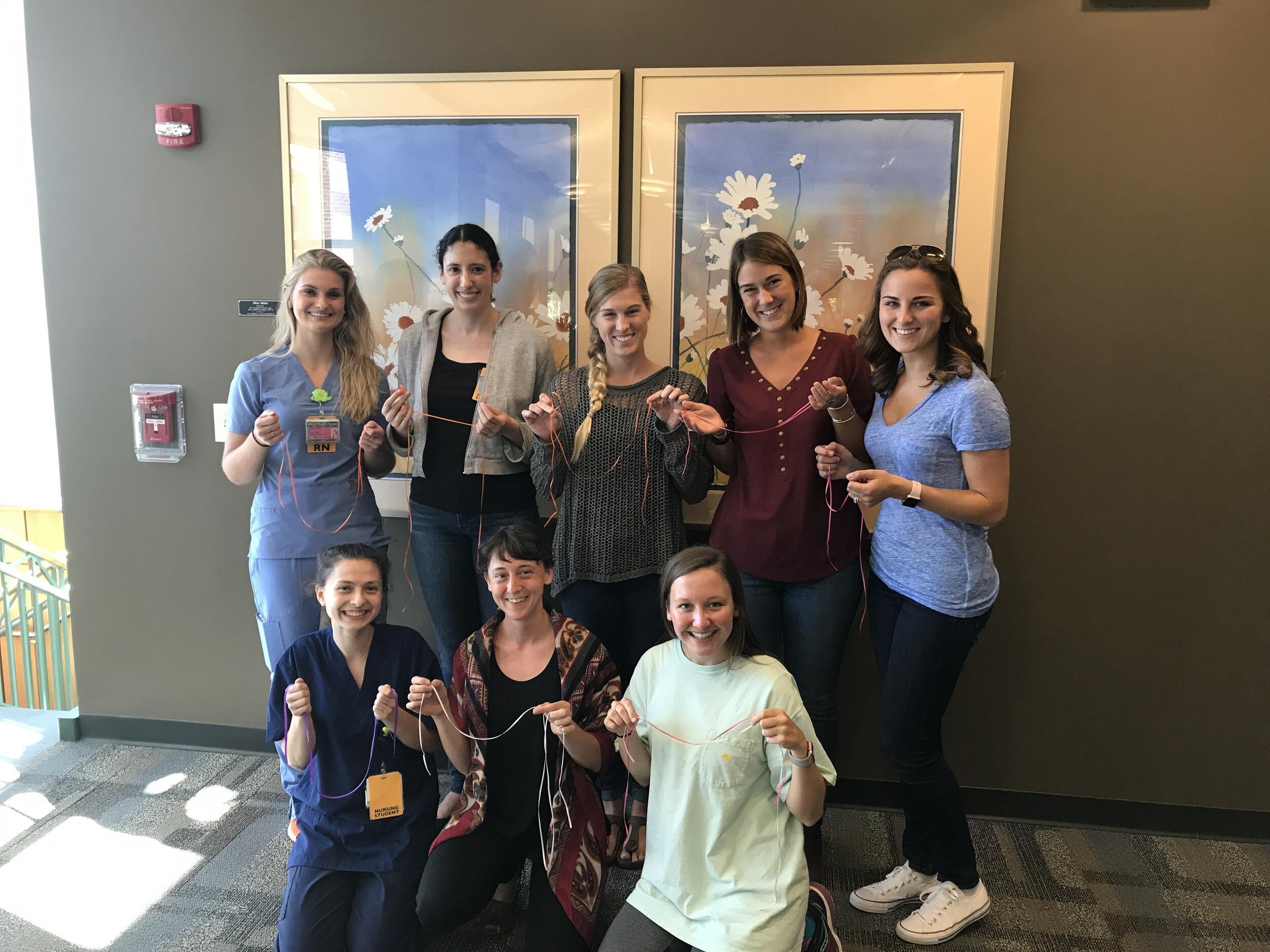
Just shy of her first year as a labor and delivery nurse, Alyssa Razak has assisted in the birth of hundreds of babies. Occasionally, photos of baby with mother — tired, but smiling after birth — will make it back to Razak. She is never in them but always remembers where she was at that moment and feels immense satisfaction.
“Not being in the pictures is just as symbolic as being with the mother because that is kind of our role. We are in the background to make this as perfect an experience as possible,” Razak said. “At the end of the day, it’s not our experience. We are assisting you in having this beautiful birth.”
Razak graduated with a nursing degree from the VCU School of Nursing in May 2017. Before working as a labor and delivery nurse she served as a doula — which translates from Greek as “woman who serves.” A doula’s role is to assist women during childbirth by providing education, empowerment and encouragement. The School of Nursing provides a two-day intensive program that trains nursing students in doula education. These second-year students can serve expectant mothers at VCU Medical Center as volunteer doulas.
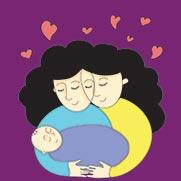
Susan Lindner, clinical assistant professor in the Department of Family and Community Health Nursing, started the course in 2010.
“This opportunity allows the student to develop their communication skills and collaborate with a family in a nonhospital setting,” she said.
Students are taught birthing skills such as the phases of labor, hormonal changes during childbirth and the best positions to ease labor.
“You learn when interventions are most appropriate because you definitely don’t want to use up all of the tricks you have in the first hours!” Razak said.
Doulas also learn strategies for giving emotional support, how to work with mothers on plans that outline choices during childbirth and to consider religious and racial diversity. They are trained to offer case management advice, such as what is and isn’t permitted at a specific hospital, so a mother’s birth plan is well-informed. Strategies for handling postpartum depression and breast feeding are also covered, along with other subjects.
Razak pairs all these skills with nursing duties, such as monitoring and reporting the progress of births to physicians and midwives (advanced practice nurses who specialize in childbirth).
“It’s such an intimate process,” she said. “I love it because every day I get to celebrate birthdays. That is always so much fun!”
M.D.-Ph.D. (School of Medicine)
VCU’s M.D.-Ph.D. track molds students into physician scientists who can practice medicine and improve patient outcomes through scientific research that can be applied across many clinical settings.

Since around 1986, the VCU School of Medicine has offered students the option of obtaining a Ph.D. in basic science or a related discipline while they earn their medical degree. The school continues to diversify its programs to anticipate future scientific and medical needs. In October 2017 it added nanoscience and nanotechnology (in conjunction with the Department of Physics in the College of Humanities and Sciences), and biomedical engineering (in conjunction with VCU’s School of Engineering) to its M.D.-Ph.D. degree offerings.
Michael Donnenberg, M.D., director of the M.D.-Ph.D. program and a School of Medicine professor, aims to ensure program offerings include social sciences and other disciplines related to patient care and research.
“One of the things that impressed me and made me excited to come here was the possibility of creating nontraditional offerings for our students,” said the senior associate dean of research and research training. “It’s less common for universities to give students the option to receive the Ph.D. side of their education in disciplines outside of the School of Medicine or classic basic science.”
Aside from offering students an intensive education, the program pays full medical and graduate school tuition and a $28,265 minimum stipend for all years enrolled. On average, six to eight students are admitted annually and it takes eight years to complete the program.
Jefferson Overlin is the first student to be accepted into the biomedical engineering M.D.-Ph.D. program.
Overlin, who is a student in the lab of René Olivares-Navarrete, Ph.D., assistant professor of biomedical engineering, said the program allows him to stay current with research trends and seek out experienced faculty. Overlin’s research currently focuses on the effects that e-cigarette use may have on fracture healing, tissue regeneration and recovery. He assists in investigations on whether e-cigarette use during pregnancy could lead to craniofacial disorders.
“E-cigarettes are now widely studied and the work that’s being done at VCU is unique and interesting,” he said. “A lot of VCU research looks at the psychology and behavioral aspects behind e-cigarette use, as well as the effect on the body, so it spans a lot of disciplines. It’s very cool to be a part of that.”
Overlin said the program is helping him meet his goal of practicing medicine and doing research at a major institution.
“I’m on an awesome journey that allows me to work at the interface of science and medicine,” he said. “Many people trained in one practice or the other are not be able to have the same remarkable experience.”
VCU programs that are unique in Virginia
| B.S. in Clinical Radiation Sciences | B.F.A. in Communication Arts | B.F.A. in Craft and Material Studies |
| B.A. and B.F.A. in Fashion | B.A. in Homeland Security and Emergency Preparedness | B.F.A. in Painting and Printmaking |
| B.F.A. in Sculpture | Undergraduate Certificate in Product Innovation | Undergraduate Certificate in Spanish/English Translation and Interpretation |
| M.S. in Addiction Studies | M.S. in Anatomy and Neurobiology | M.S. in Dentistry |
| M.S. in Genetic Counseling | M.S. in Gerontology | M.A. in Homeland Security and Emergency Preparedness |
| M.S. in Human Genetics; | M.S. in Nurse Anesthesia | M.S. in Patient Counseling |
| M.S. in Pharmaceutical Sciences | Master of Product Innovation | M.S. in Rehabilitation and Mental Health Counseling |
| Graduate Certificate in Addiction Studies | Graduate Certificate in Aging Studies | Graduate Certificate in Health Behavior Coaching |
| Graduate Certificate in Health Sciences | Graduate Certificate in Homeland Security and Preparedness | Graduate Certificate in Patient Counseling |
| Graduate Certificate in Professional Counseling | Ph.D. in Chemical Biology | Doctor of Dental Surgery |
| Ph.D. in Human Genetics | Ph.D. in Integrative Life Sciences | Ph.D. in Nanoscience and Nanotechnology |
| Doctor of Nurse Anesthesia Practice | Ph.D. in Oral Health Research | Ph.D. in Pharmaceutical Sciences |
| Ph.D. in Rehabilitation and Movement Science | Ph.D. in Social and Behavioral Sciences |
Subscribe to VCU News
Subscribe to VCU News at newsletter.vcu.edu and receive a selection of stories, videos, photos, news clips and event listings in your inbox.












